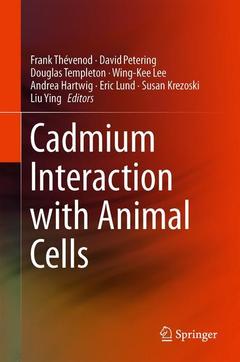Cadmium Interaction with Animal Cells, 1st ed. 2018
Coordonnateurs : Thévenod Frank, Petering David, M. Templeton Douglas, Lee Wing-Kee, Hartwig Andrea

This book outlines the interaction of cadmium with the proteome and signalling molecules of mammalian cells. Chapters from expert contributors cover topics such as cadmium chemical biology, membrane receptors and transporters for cadmium and cadmium complexes, and targets of cadmium toxicity. Students and researchers working in bioinorganic chemistry will find this book an important account.
Membrane Transport Proteins and Receptors for Cadmium and Cadmium Complexes.- The Chemical Biology of Cadmium.- Interactions of Cadmium With Signaling Molecules.- Cell Organelles as Targets of Cadmium Toxicity.- Cadmium and its Impact on Genomic Stability.
David Petering obtained a BA from Wabash College and his PhD in Biological Chemistry from the University of Michigan with Graham Palmer. Currently, he is a University Distinguished Professor of Chemistry and Biochemistry at the University of Wisconsin-Milwaukee. Petering’s research focuses broadly on metals in biological systems and has addressed the mechanism of action of metallodrugs and toxic metals, particularly, cadmium; the chemistry and cellular functions of metallothionein; the biochemistry of zinc sensors; and the pathways of intracellular trafficking of zinc and cadmium.
Doug Templeton did his PhD in Chemistry at Carleton University, Ottawa, Canada, and then attended the University of Western Ontario where he obtained his MD. He is currently a Professor in the Department of Laboratory Medicine and Pathobiology at the University of Toronto, where he founded an undergraduate program in Pathobiology. Over the years, his research has shifted from bioinorganic chemistry and analytical toxicology to the cell biology and molecular toxicology of metals, with a focus on iron and cadmium. Doug has a long-standing involvement in the International Union of Pure and Applied Chemistry, as a former President of the Division of Chemistry and Human Health and currently as Chair of the IUPAC Project Committee. His more recent technical work in IUPAC is in terminology for toxicology.
Wing-Kee Lee completed her PhD in Toxicology at the Univ
Outlines cadmium interaction with mammalian cells
Elucidates reactions of cadmium with the proteome
Explores the impact of cadmium’s toxicity
Date de parution : 01-2019
Ouvrage de 125 p.
15.5x23.5 cm



